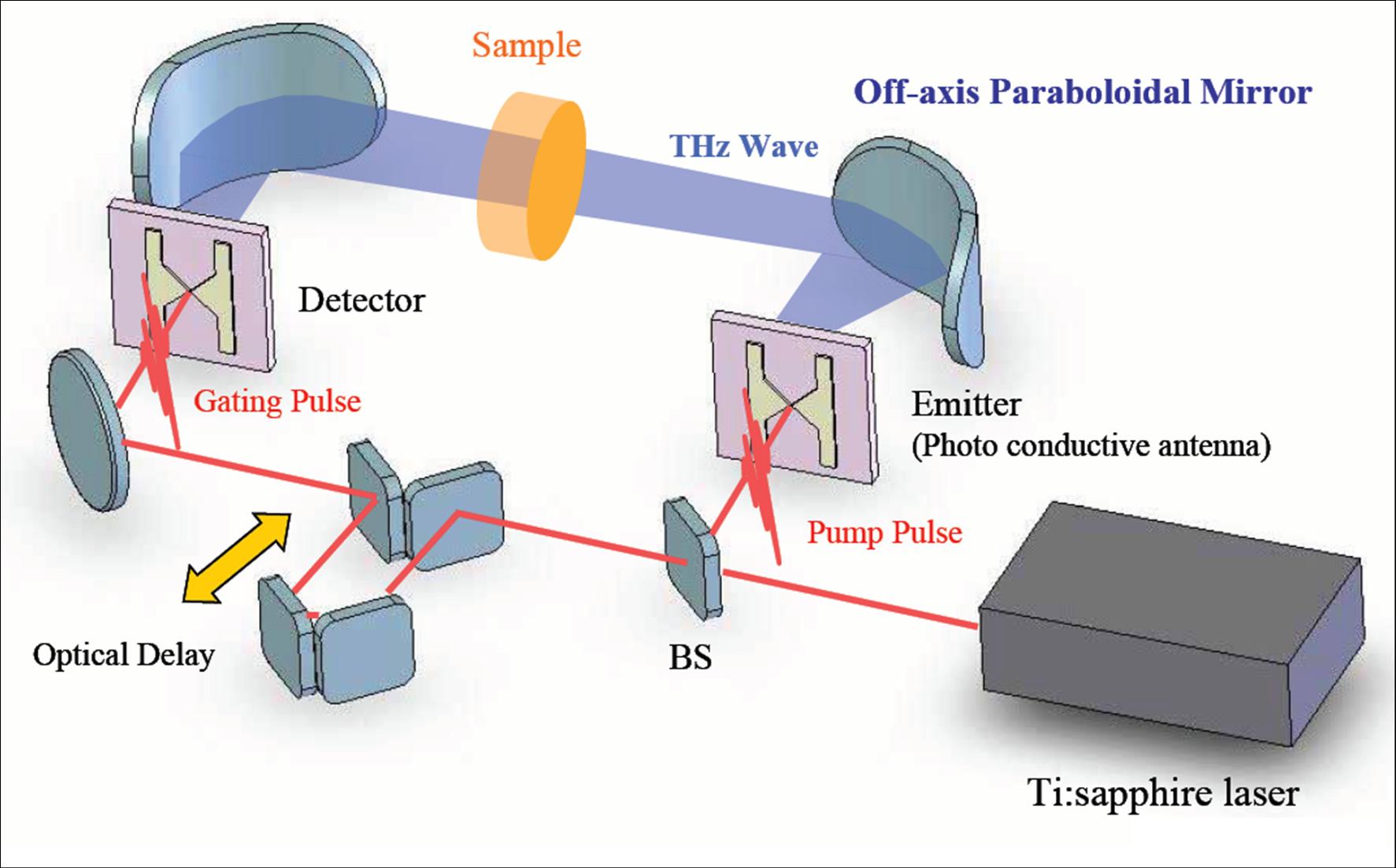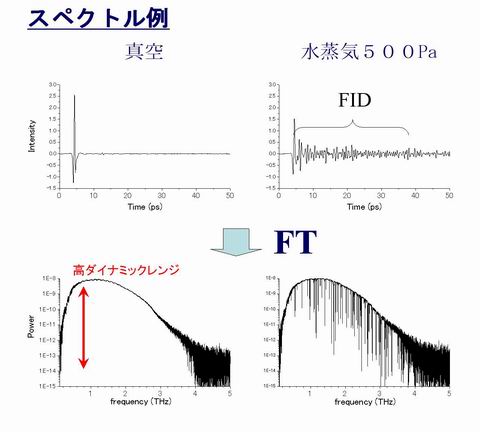Research
| Research Top
| Super conductor THz detector
| Tomography
| Gas spectroscopy
| High power THz source
| SPR sensing |
Molecular spectroscopy by a Terahertz Time Domain Spectrometer (Hiromichi Hoshina)
1. Introduction

Terahertz is the name of frequency (1012 Hz), just between infrared and microwave in the electro-magnetic wave,
which has been called "Far Infrared" in past. From the viewpoint
of molecular spectroscopy, a lot of information about molecular
structure and molecular motion can be obtained from the spectra in this
region, such as rotational spectra of light molecules, lower
vibrational spectra carbon chaines, the internal rotational motion of
molecules and intermolecular vibrations.
2.THz-TDS spectrometer

In
our lab. we are focusing on the molecular spectroscopy by a recently
developed Terahertz Time Domain Spectroscopy (THz-TDS). Since
THz-TDS is more sensitive and more stable than conventional FT-IR
spectrometer, we expect to make more accurate measurement by using our
system.
In THz-TDS system, transient change of the electric field made by a femto second laser (pulse width = ~100 fs) is used as a THz wave source, and the change of the pulse shape after passing through the sample is detected. In our system, the production and extinction of carriers on the biased photo-conductive antenna make transient change of the electric field, and the time profile of the electric field is detected on by a probe pulse with changing the detecting timing which was scanned by a optical delay stage.
The obtained waveform of the electric field is then Fourier transformed to the frequency domain power spectrum. The spectra below show the example of the THz time domain waveform with and without sample (H2O 500 Pa). Due to the coherent rotational motion of the sample, the time domain wave form shows structure after main pulse, called "free induction decay (FID)". After Fourier Transform, these FID are transformed to the absorption lines in the frequency domain spectra.

The
table below shows comparison of conventional spectroscopic apparatus
with THz-TDS. Compared to the continuous wave light sources such
as Tu-FIR and BWOs, THz-TDS has no advantage for high resolution
spectroscopy. However, for the spectroscopy in lower resolution,
it can make more accurate measurement of line shape and line intensity
in better S/N ratio than FT-IR.
3. Pressure broadening parameters of rotational lines of water vapor
As one of the application of THz-TDS for molecular spectroscopy, we measured precise pressure broadening parameters of water vapor.
2.THz-TDS spectrometer

In THz-TDS system, transient change of the electric field made by a femto second laser (pulse width = ~100 fs) is used as a THz wave source, and the change of the pulse shape after passing through the sample is detected. In our system, the production and extinction of carriers on the biased photo-conductive antenna make transient change of the electric field, and the time profile of the electric field is detected on by a probe pulse with changing the detecting timing which was scanned by a optical delay stage.
The obtained waveform of the electric field is then Fourier transformed to the frequency domain power spectrum. The spectra below show the example of the THz time domain waveform with and without sample (H2O 500 Pa). Due to the coherent rotational motion of the sample, the time domain wave form shows structure after main pulse, called "free induction decay (FID)". After Fourier Transform, these FID are transformed to the absorption lines in the frequency domain spectra.

| CW laser, BWO | FT-IR | THz-TDS | |
| 周波数分解能 | ~MHz | ~100 MHz | 1GHz |
| 測定範囲 | ~10 THz | ~100 THz以上 | ~4.0 THz |
| 光源のパワー | mW ~ nW | mW | mW |
| 検出器 | Si Bolometer / InSb Detector (4K) | EO/ 光伝導アンテナ (300K) | |
| NEP@3THz | 10-9 ~10-10 W・Hz1/2 | ~10-16 W・Hz1/2 | |
| ダイナミックレンジ |
| ~103 | ~108 |
| S/N |
| ○ | ◎ |
| 光源の安定性 |
| ○ | ◎ |
| 変調した検出 | ◎ | △ | △ |
| 実験の容易さ | × | ○ | ◎ |
3. Pressure broadening parameters of rotational lines of water vapor
As one of the application of THz-TDS for molecular spectroscopy, we measured precise pressure broadening parameters of water vapor.
THz spectroscopy of the planets in the solar system will provide important information for the planetary science because gases at those temperatures usually have emission peaks in the THz region. For example, the accurate calculation of the pressure broadening of the transitions of the water vapor is important in the estimation of the Earth thermal balance (actually 60 % of thermal radiation is due to water vapor).

The figure below shows the obtained parameters. Compared to the values from HITRAN database, our parameters show 10% smaller values.

